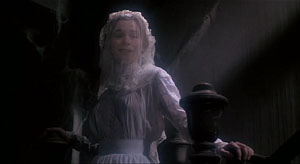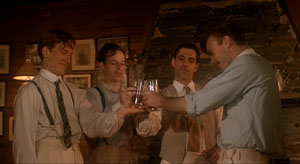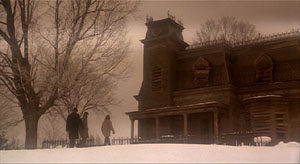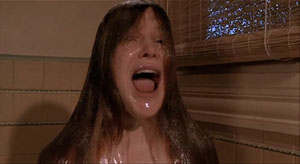|
You can also watch my video review of this film. There are moments which can change a person's life. This isn't a favorite film, nor is it so bad as to be worthy of snide, abusive mockery. But it is a film which stands out in my filmgoing experience by virtue of the fact that when I first saw it, at the too-young age of eleven, it scared the living hell out of me. The living Hell. For this reason, utterly independent of any opinions of the film's overall quality, I am virtually obliged to find it significant. 
When I say I saw it, I of course mean that I saw the first twenty or so minutes of it, after which I could take no more and had to depart. The ghost of this particular story particularly enjoyed sneaking up on her victims and surprising them with her "I'm a slowly disintegrating corpse" face, and with what were clearly too many remaining victims still waiting for their turn, I opted for the better part of valor and ran like a frightened little kid rather than see it happen even one more time. Hours later, I was still loath to be left alone in a room, and was none too happy with the fact that, as we were on vacation in a house with too few guest beds, I had to sleep on the floor that night. There was no way to safely keep watch on the underside of the bed without leaving my back turned to the indescribably hideous things that were surely creeping from beneath the dresser. Because of this, I retained a pervasive terror of skeletons and images of dead bodies that persisted until I finally saw Sam Raimi's Army of Darkness, which effectively rewrote my paradigm to the more agreeable "dead people are stupid" viewpoint. Of course, I felt like a snivelling coward, and in the bright light of day, I periodically told myself that at some point I'd sit through the whole film and face it down. At night, naturally, this inclination fell sharply away as I lay in bed simultaneously trying to and trying not to picture the ghost's face, (which my mind had all but blotted out) in that stupid masochistic way that people try to scare themselves so they can lie there in the dark feeling awful for no good reason. Humans would be perfectly willing to run up to the gates of Hell itself, provided it really existed, to bang on them and yell, "I ain't scared of you!" before running away again. So it transpired that when I was twenty-eight, I happened to catch the film on cable one night, and resolved to sit through it at last.  Seventeen years changes the way you see things. This time, I was not so concentrated on the hideous appearance of the ghost as I was on how especially bad the subsequent bluescreen shot was. I'd never seen the bad bluescreen shot before, because I'd still been hiding my peepers the first time. By the end, I was convinced of two things: that I was no longer as easily scared, but that I'd been perfectly justified, and perhaps even wise, to have bailed when I did on the previous viewing, because it did in fact get worse. It also had a fair amount of sex and nudity, which would've embarrassed the crap out of me to see with my mom sitting right beside me. The Peter Straub novel on which the film is rather loosely based is quite a great deal more imaginative than the film, which took the most basic portions of the premise only. Five (or four) elderly men, dubbed "The Chowder Society," who regularly meet and tell horror stories have a fifty-year-old secret to hide, which starts coming back into their lives and picking them off. The nephew (or son) of one of them comes to town after also being targeted by a mysterious force, which claims his brother's life instead. And beyond the names, that's about as similar as the stories get. The "ghost" of the book isn't merely seeking revenge for crimes of the past, but is rather a completely inhuman entity which had malicious intent from the start. Her two supernatural adepts, Gregory and Fenny Bate, have such small roles in the film that it would almost have made more sense to leave them out completely. And never in the book is the ghost said to have suddenly put on the visage of a rotting corpse in order to scare its victims, even though this appears to be its sole ability in the film.  It's next to pointless to argue whether or not something is scary. "Scary" is a totally subjective attribute, which is why it's of no use to argue that snakes aren't scary to anyone possessed of acute snakeophobia*. I will say that the images of the dead woman's ghost are rather shockingly gruesome, probably the most so of any I've ever seen, minus the probably part. I suppose that's an accomplishment of sorts, but it isn't terribly imaginative in the end. In some ways, it points to the limitations of film, and its overall remoteness. In real life, seeing a person change into another completely normal-looking person would still be terrifying, because it would completely rail against our sense of logic. It would signify that we were in the presence of something that wasn't human. But seeing this in a film isn't at all frightening; in fact, it's almost commonplace. Consequently, films have to work harder to produce scares, and this one went for the visceral shock approach. Unfortunately, this runs rather against the grain of the stylish psychological approach the film is obviously shooting for. Young Don Wanderley's flashback story of meeting the ghost under the name of Alma Mobley is the most effective part of the film, as it plays upon the audience's foreknowledge of the ghost's true face, building suspense and dread instead of going straight for the "Booga!" moments, which is especially effective in the "Alma sinks into the bathtub" scene. But afterwards, it's back to the old "Yuckers! I'm dead!" trick again, even when the intended victim has nowhere to conveniently leap to his death.  So, taken as an entity unto itself, without comparisons to the novel, is there anything worth seeing here? In many ways, yes. This is one of the more unusual films of its kind I've seen; it has its fingers in more pies and more moods than most films dare attempt, and has so little in common with modern examples of the genre as to be startling. This is a horror film without a single teenager among the principals. There are vast stretches of the narrative that feel nothing like horror, making the scary bits feel, much as in real life, all the more jarring and disturbing for it. One can't imagine it being made in a prior era of film, either; with its grotesque shocks and a cavalier attitude towards nudity that's largely diminished today, it could only have been made during the narrow window of time when it was. Ghost Story tries to have it all: the beautiful, the seductive, the sad, the horrifying. And Alice Krige is truly well cast as the ghost herself, projecting a presence that's alluring and frighteningly remote. But the film's pacing is out of tune in many places, spending too long on certain parts whilst skimping on others. It's the ending that really derails the film, by virtue of its jarring abruptness. It is completely dissimilar to the ending of the book, but more importantly, it doesn't really do the film preceding it justice (and really, what did the director tell the actors that they were supposed to be looking at during that final lakeside scene? Not a one of them looks scared shitless, which all of them should've). A more elaborate finale appears in the original shooting script (along with many other ultimately cut scenes) that would've brought the narrative full-circle, but alas, it never made the final cut. Kubrick's The Shining, while not without its flaws, is still an excellent horror flick that bears only a superficial similarity to its source material. Ghost Story director John Irvin doesn't manage to capture that balance between the original story and the constraints of the medium of film, and the movie feels too much like a lost opportunity. I'm glad I saw this film in its entirety at last, if only to vindicate myself, but I must admit I'm not terrifically keen on seeing it again; the latent creeptitude still lingers in me, even after all these years, and possibly always will. Were it a better film, it might be worth the effort, but beyond that, there's only so many times we need to prove certain things to ourselves. P.S. As an interesting aside, one of the characters in the book mentions how Fred Astaire, in his suit and tie, looked rather like the members of the Chowder Society. Fred Astaire did in fact end up playing one of them, in his final screen appearance. -review by Matt Murray *This is the actual term for fear of snakes, and any headshrinker who tells you otherwise is nothing but a two-bit charlatan who just wants your money.
|
|
||||||||